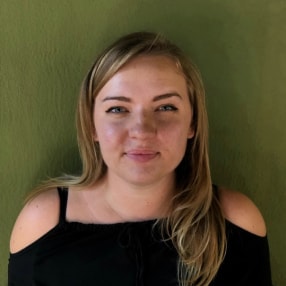This is our first "Behind Clyde" post, where we’ll introduce the people who make our work at Clyde possible with the goal of highlighting and celebrating their different backgrounds, experiences, and contributions.
Travis Amiel on the role creative storytelling plays in customer success
When the rest of Travis Amiel’s middle school class was making tri-fold book reports on what their history class had learned about World War II, Travis was remixing archival clips into a three-minute video.
Travis, who is Clyde’s Merchant Onboarding Specialist, has always had a penchant for doing things his own way. And more often than not, that way has involved combining technology and creativity to tell a story.
His two main gigs in college are good examples of that. He worked at his school’s IT Help Desk, solving problems under pressure for students and professors, while learning to navigate different types of technology along the way. He served as a student staffer helping run HowlRound, which he describes as “a theater knowledge commons where theatermakers from around the world talk about what they’re making, how they’re making it, and how they’re pushing the field to adopt more countercultural ideas, practice more experimental aesthetics, and be a platform where people who previously haven’t had much representation on stage or around stages have an open platform to share what they’re doing.” One of his biggest projects there was helping to build the World Theater Map, which was a global directory of theater organizations around the world, from puppetry in Sweden to musical theater in Kenya. He also produced shows and live theater.
Travis credits his experience with HowlRound with sparking his love for startups, which is what eventually brought him to Clyde.
Finding a mission to believe in
Travis knew that he wanted to work for a forward-thinking company that was trying to flip a more established market segment on its head, because that’s what he loved about working in a transformative theater organization.
That’s exactly what he’s found at Clyde.
“The extended warranty world is really messy,” Travis explains. “How can we as a company go in and make that process easier for retailers and merchants? It’s a net positive for everyone involved. Customers know when they buy an extended warranty plan that their product will be protected, merchants have an additional revenue stream and help if something goes wrong, and insurance companies can expand into different categories.”
Travis knew from his first interview with Clyde’s VP of Implementation and Success, Melissa Donahue, that Clyde’s mission and culture aligned with his interests. “
He notes how many miscommunications there are around extended warranties, and how Clyde is setting out to fix those. “Even simple things, like do people need to have a piece of paper, or remember their purchase number? With Clyde, that information is emailed to you, and if you need to file a claim, you can just go to the website and type in your email.”
How stories can solve problems
On a daily basis, Travis works with small and medium businesses who use Clyde to help onboard them onto the platform and troubleshoot any issues with implementation. That can mean helping to solve understanding gaps between the merchant and the insurer, like about how to categorize certain products—is an electronic soccer net part of sporting goods or part of electronics?
Lately, one of his biggest projects has been building out an internal documentation tool for the rest of the Clyde team. The spreadsheet maps the journey that customers go on when they install Clyde. “Writing it felt like programming a game or writing a play or choreographing a dance piece. You do this, and then this happens. It’s that imagination of scripting, which I find very fun when you get it right and you have all the details there, and it’s a great way to explain a complicated process,” he says.
That kind of practical storytelling is so useful, notes Travis, because it allows everyone who works for Clyde to have broader visibility beyond the silo of their day-to-day. A salesperson can check to see what a client’s step-by-step adoption process would be like, for example, or an engineer can see how the marketing team demos part of the app’s functions.
Writing your own story on the job market
Here at Clyde, Travis has found a role that uses his skills, lines up with his values, and allows him to make a direct impact on a changing industry. He has advice for other young professionals who are thinking about joining a startup, and it’s centered around the importance of narrative.
“Cultivate a narrative around yourself that allows you to explain, ‘This is where I’ve come from, what I’ve done, my achievements, and examples of overcoming problems,’” he says. “Take everything you’ve done and find the right way to articulate your contributions.” An example, he notes, would be taking something that reads relatively dry on paper, like an internship spent doing data entry, and reframing it around the business goals that it augmented, like improving process inefficiencies or building a richer picture of customer segmentation.
Approaching challenges with gratitude and grace
At the end of the day, Travis says he’s happy to be working for Clyde because it feels like his work is “a real value-add for customers.” He compares Clyde against companies who “do something superfluous for a monthly cost, or promise something but don’t quite deliver on it,” saying, “Clyde has a really clear offering, cost, and use.”
That positive and gratitude-based approach is something Travis applies to other parts of life, too. Even though his extracurricular theater projects have evaporated during the pandemic, he’s since turned to other forms of storytelling and community. “If I can’t work on performances, I do know how to make games and interactive websites and videos, so why don’t I just do more of that and not wallow in being unable to gather?” he asks.
SIGN UP FOR OUR NEWSLETTER





























